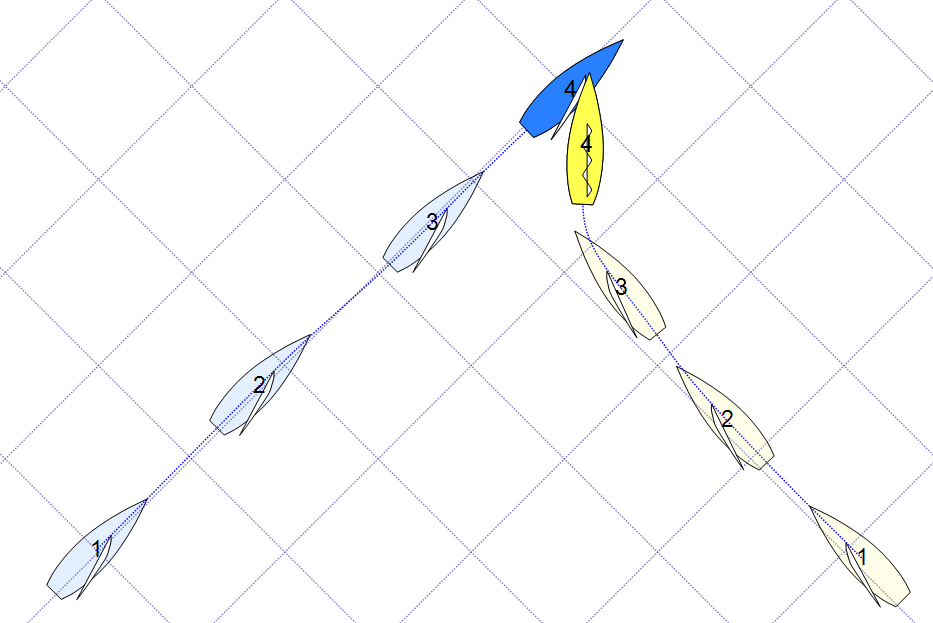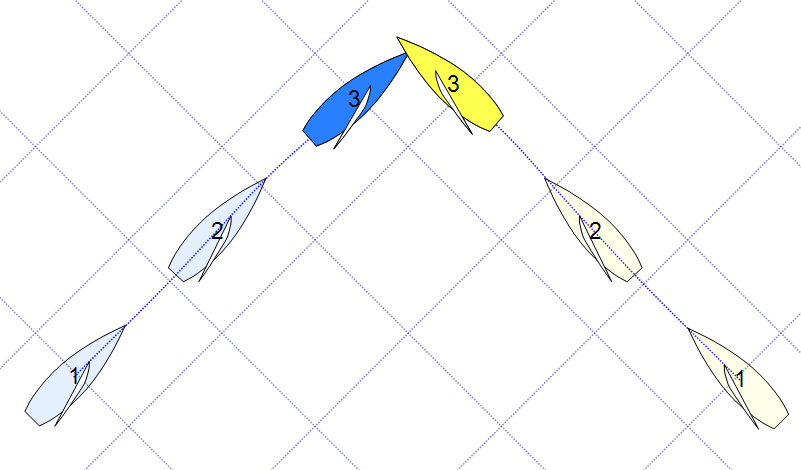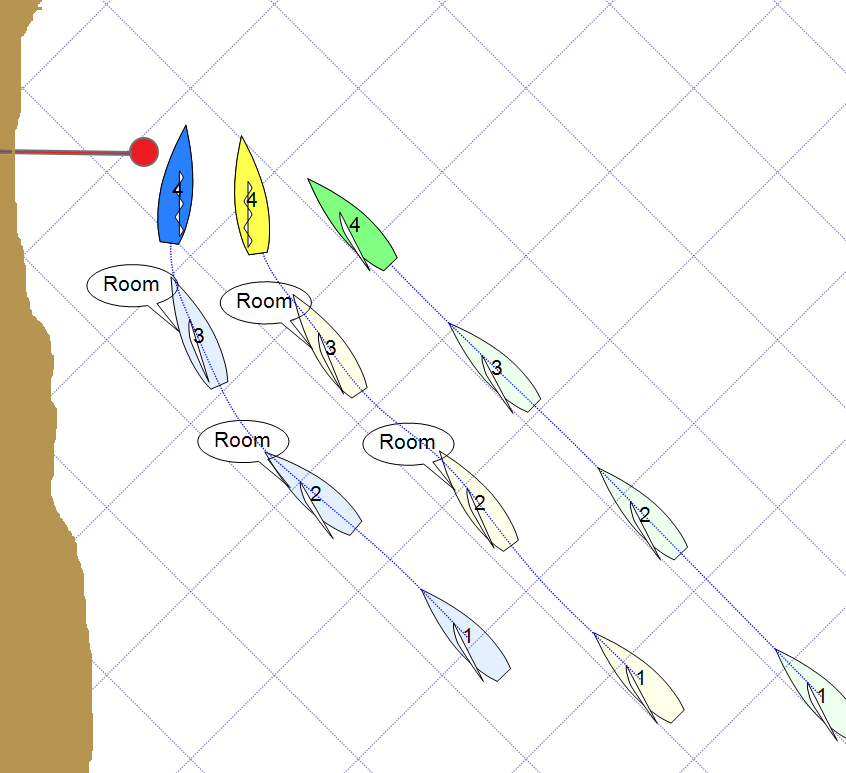The event is not active. You cannot add or edit event documents
Forum: The Racing Rules of Sailing
Does the RRS Require Reasonable Care?
P
Paul ZupanAdministrator
Nationality: United States
Certifications:
- International Judge
- National Judge
As much as judges struggle with RRS 2, let me add another dimension to the discussion. I believe that too often judges fail to consider RRS 2 where the question is negligence. And, I believe that RRS 2 requires a PC to consider it in many fairly common situations.
RRS 2 requires that a boat and her owner shall compete in compliance with recognized principles of sportsmanship and fair play. I'm not going to delve into the nuances of this language except to acknowledge that the rule does ask the question, "did the competitor act in a way we would consider to be unsportsmanlike," and commonly that is interpreted as some sort of intent to break a rule. (See case ). But let's also consider negligence, which is defined as a failure to exercise reasonable care. Negligence doesn't consider the intent of the competitor, instead considering whether he or she departed from the conduct expected of a reasonably prudent sailor acting under similar circumstances. Is that not unsportsman like?
The first example is a fairly straight forward port starboard situation unfortunately not that uncommon. Without any further information, did either boat break RRS 2?

I would conclude port broke RRS 2. Port probably failed to keep a proper lookout, which I believe is negligent and therefore unsportsmanlike like. But starboard took avoiding action (whether or not it was soon enough is a different question relevant to our RRS 14 determination) and tried but failed to keep clear. So starboard's response falls into what I would consider the action of a reasonably prudent sailor.
But, did starboard break RRS 2 in this situation?

I would suggest that both boats broke RRS 2. At a minimum, it appears neither boat kept a proper lookout, which I believe is negligent, and therefore unsportsmanlike like. But that analysis means we did not consider the intent of either boat/competitor. (Had we concluded either intended to proceed into that situation and intentionally break a rule without mitigating circumstances, surely we would conclude it broke RRS 2).
And finally the following scenario. This is unfortunately (mostly) a real situation, but in fairness to the competitors, we won't discuss the details of the protest (the diagram is not from the protest). As the three boats approach an obstruction (a shoreline with a navigational marker), the green boat does not respond to the hails from the other boats. The blue boat is dis-masted after being entangled in the navigational marker. Did green break RRS 2?

So the question is, do you believe RRS 2 includes negligence? And if not, do you think the policy behind RRS 2 extends to penalizing sailors who act in a negligent manner (and therefore we should change RRS 2 to include it)?
Created: 17-Mar-05 15:26
Comments
Format:
[You must be signed in to add a comment]
I have a case, a port/starboard case with serious damage currently under appeal so no details but one issue was whether or not rule 2 had been broken. The protest committee certainly considered that there had been negligence from both parties but that it did not amount to a breach of "recognized principles of sportsmanship and fair play"
I've always been guided by the principle: "Never ascribe to malice what can be adequately explained by ignorance"
Rule 2 is for malice, not ignorance.
I think you are closer to defining "unseamanlike" rather than "unsportsmanlike".
Maybe the best regatta discussions I've had are around the question, "What facts would lead us to the conclusion that a competitor intended to disregard or break the rule?" Most of the married judges say their spouses have no problems determining their intent while concluding it is impossible for them to determine their spouses. More seriously, I've had more than a few instances where a competitor missed a mark and, I think, never realized it.
This issue is addressed in the new case on misconduct (which has been approved but not published - it may get some final editing) and there is a clear example of what Paul is referring to.
<!-- /* Font Definitions */ @font-face {font-family:"MS 明朝"; mso-font-charset:78; mso-generic-font-family:auto; mso-font-pitch:variable; mso-font-signature:1 134676480 16 0 131072 0;} @font-face {font-family:"Cambria Math"; panose-1:2 4 5 3 5 4 6 3 2 4; mso-font-charset:0; mso-generic-font-family:auto; mso-font-pitch:variable; mso-font-signature:3 0 0 0 1 0;} @font-face {font-family:Calibri; panose-1:2 15 5 2 2 2 4 3 2 4; mso-font-charset:0; mso-generic-font-family:auto; mso-font-pitch:variable; mso-font-signature:-520092929 1073786111 9 0 415 0;} /* Style Definitions */ p.MsoNormal, li.MsoNormal, div.MsoNormal {mso-style-unhide:no; mso-style-qformat:yes; mso-style-parent:""; margin-top:0cm; margin-right:0cm; margin-bottom:10.0pt; margin-left:0cm; line-height:115%; mso-pagination:widow-orphan; font-size:11.0pt; font-family:Calibri; mso-ascii-font-family:Calibri; mso-ascii-theme-font:minor-latin; mso-fareast-font-family:"MS 明朝"; mso-fareast-theme-font:minor-fareast; mso-hansi-font-family:Calibri; mso-hansi-theme-font:minor-latin; mso-bidi-font-family:"Times New Roman"; mso-bidi-theme-font:minor-bidi; mso-fareast-language:EN-AU;} .MsoChpDefault {mso-style-type:export-only; mso-default-props:yes; font-size:11.0pt; mso-ansi-font-size:11.0pt; mso-bidi-font-size:11.0pt; font-family:Calibri; mso-ascii-font-family:Calibri; mso-ascii-theme-font:minor-latin; mso-fareast-font-family:"MS 明朝"; mso-fareast-theme-font:minor-fareast; mso-hansi-font-family:Calibri; mso-hansi-theme-font:minor-latin; mso-bidi-font-family:"Times New Roman"; mso-bidi-theme-font:minor-bidi; mso-fareast-language:EN-AU;} .MsoPapDefault {mso-style-type:export-only; margin-bottom:10.0pt; line-height:115%;} @page WordSection1 {size:612.0pt 792.0pt; margin:72.0pt 90.0pt 72.0pt 90.0pt; mso-header-margin:36.0pt; mso-footer-margin:36.0pt; mso-paper-source:0;} div.WordSection1 {page:WordSection1;} -->
"In amplification of rule 69.1(a), the following actions should be considered as examples of misconduct, but they are not exclusive examples and not a definitive list:
.......
..... 5. Acting recklessly or in manner that does, or is likely to, cause damage or injury ....."
We provided an extract to our sailors at an event earlier this year on the back of the Race Sailing Instructions and the feedback was unanimously "fair enough".
Here's what we gave them if you want an idea about how to introduce it.
http://sscbc.com.au/wp-content/uploads/2017/03/RSI-Portsea-Cup-2017-V3.pdf For our club, we think we want to make sure everyone is aware of the standard and bring them all up to it.
The full case can be found here http://www.sailing.org/tools/documents/08816RacingRulesofSailingNewCaseRule69-[21279].pdf
<!-- /* Font Definitions */ @font-face {font-family:"MS 明朝"; mso-font-charset:78; mso-generic-font-family:auto; mso-font-pitch:variable; mso-font-signature:1 134676480 16 0 131072 0;} @font-face {font-family:"MS 明朝"; mso-font-charset:78; mso-generic-font-family:auto; mso-font-pitch:variable; mso-font-signature:1 134676480 16 0 131072 0;} @font-face {font-family:Calibri; panose-1:2 15 5 2 2 2 4 3 2 4; mso-font-charset:0; mso-generic-font-family:auto; mso-font-pitch:variable; mso-font-signature:-520092929 1073786111 9 0 415 0;} /* Style Definitions */ p.MsoNormal, li.MsoNormal, div.MsoNormal {mso-style-unhide:no; mso-style-qformat:yes; mso-style-parent:""; margin-top:0cm; margin-right:0cm; margin-bottom:10.0pt; margin-left:0cm; line-height:115%; mso-pagination:widow-orphan; font-size:11.0pt; font-family:Calibri; mso-ascii-font-family:Calibri; mso-ascii-theme-font:minor-latin; mso-fareast-font-family:"MS 明朝"; mso-fareast-theme-font:minor-fareast; mso-hansi-font-family:Calibri; mso-hansi-theme-font:minor-latin; mso-bidi-font-family:"Times New Roman"; mso-bidi-theme-font:minor-bidi; mso-fareast-language:EN-AU;} .MsoChpDefault {mso-style-type:export-only; mso-default-props:yes; font-size:11.0pt; mso-ansi-font-size:11.0pt; mso-bidi-font-size:11.0pt; font-family:Calibri; mso-ascii-font-family:Calibri; mso-ascii-theme-font:minor-latin; mso-fareast-font-family:"MS 明朝"; mso-fareast-theme-font:minor-fareast; mso-hansi-font-family:Calibri; mso-hansi-theme-font:minor-latin; mso-bidi-font-family:"Times New Roman"; mso-bidi-theme-font:minor-bidi; mso-fareast-language:EN-AU;} .MsoPapDefault {mso-style-type:export-only; margin-bottom:10.0pt; line-height:115%;} @page WordSection1 {size:612.0pt 792.0pt; margin:72.0pt 90.0pt 72.0pt 90.0pt; mso-header-margin:36.0pt; mso-footer-margin:36.0pt; mso-paper-source:0;} div.WordSection1 {page:WordSection1;} -->
http://www.sailing.org/tools/documents/08316RacingRulesofSailingCase54-[21271].pdf
I wouldn't want to add to the general comment having made my opinions clear but it's good to know that Pat's wife doesn't read his emails!
I think protest committees do not look at rule 2 nearly enough. In my mind at least, rule 2 is all about winning by unsportsmanlike conduct. When a boat barges at the start and breaks rule 11 with respect to the boat to leeward of her, I think she probably breaks rule 2 -- she knows there's a rule requiring her to keep clear and she purposely breaks it in order to win the boat end of the line. Ditto the boat that comes into the port-hand windward mark on port tack, crash tacks and then sails around the mark, breaking one of rules 13, 18.3, or 31. Regardless of whether the offender takes her turns or, if she does, gains an advantage, she knows there are rules prohibiting her action and she breaks them intentionally in order to avoid the consequences -- in the case of barging, getting a lusy start; in the case of the port-tack boat at the windward mark, ducking several boats on the starboard layline. That, in my mind, breaks rule 2 and she should be penalized for that.
One last comment: I'm puzzled by Paul's analysis of the first scenario he gives. It certainly looks as if Yellow breaks rule 16.1 here -- if she had sailed straight she would have missed Blue, or at the very worst, would have had to make a small duck. By hunting up, she causes major contact, and there's no way Blue can keep clear in a seamanlike manner. Paul asserts that Blue didn't maintain a lookout, but she may have simply believed she could cross Yellow safely -- clearly not a rule-2, or even a rule-14, violation.
I would potentially consider such a situation as misconduct under rule 69.1(b)(2) conduct that may bring the sport into disrepute, if there was serious injury. I would appreciate other's thoughts on this view.
I would not suggest that the word negligence be added to the sailing vocabulary I think that there is sufficient power to in the current rules to get to the desired effect and the pejorative connotations of finding fault with methods of sailing vs the specific actions may lead to greater stress in hearings, specially when that language may have serious legal consequences.
I greatly appreciate Paul's efforts and analysis of these scenarios and the discussion it generated.
Reckless tends to be seen as active. Not keeping a proper lookout may be negligent. Tacking into a boat that is too close for it to be a safe maneuver would seem reckless. The reason I like this distinction is that it is easier to get to intent with an active component. (someone intended to tack). Its very hard to argue that someone intended or expected that something bad would happen when they don't keep a proper lookout. In fact they incorrectly assumed that nothing bad would happen and were wrong.